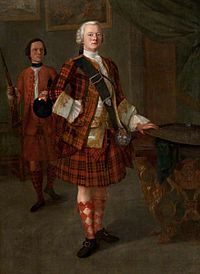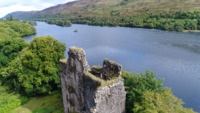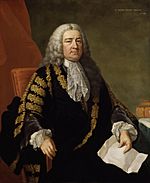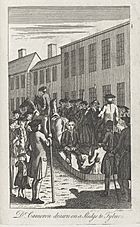Alastair Ruadh MacDonnell facts for kids
Quick facts for kids
Alastair Roy MacDonell
|
|
|---|---|
 |
|
| Born | 5 January 1725 Invergarry Castle, Scottish Highlands |
| Died | 23 December 1761 (aged 36) Invergarry Castle, Scottish Highlands |
| Title | 13th Chief, Clan MacDonell of Glengarry |
| Tenure | 1754–1761 |
| Other titles | soi disant Jacobite Lord MacDonald |
| Nationality | Scottish |
| Parents | John MacDonell of Glengarry (died 1754) Margaret Mackenzie |
|
|
|
Alastair Roy MacDonell (born around 1725, died 1761) was an important Scottish clan leader. He was the 13th chief of the Clan MacDonell of Glengarry. His Scottish Gaelic name was Alasdair Ruadh MacDomhnaill.
Alastair grew up as a Catholic and studied in France. In 1745, he was arrested while trying to join the 1745 Jacobite Rising. After being released from the Tower of London in 1747, he started working as a secret agent for the British government.
He became the chief of his clan in 1754. Alastair MacDonell never married and passed away in 1761. His nephew, Duncan, then became the next chief.
Contents
Early Life of Alastair MacDonell

Alastair MacDonell was born in 1725. He was the oldest son of John MacDonell of Glengarry. His father was a leader in the small Scottish Catholic community. Alastair's mother was Margaret Mackenzie.
His mother died around 1728. His father then married Helen Gordon. She was the daughter of John Gordon of Glenbucket. Alastair had a younger brother named Aeneas. He also had several half-brothers and sisters from his father's second marriage.
Alastair MacDonell's Career
Education and Early Jacobite Connections
Many Catholics in Scotland at that time went to France for school. Alastair MacDonell went there in 1738 to finish his education. This was a time when the Jacobites hoped to bring back the Stuart kings. France and Spain wanted to stop Britain from becoming too powerful.
In 1740, the War of the Austrian Succession began. Britain and France were on opposite sides. In 1743, Louis XV of France planned to invade England. This was to help the Stuarts return to power. Alastair joined a French regiment called the Royal-Ecossais as a captain. But the invasion was stopped in 1744 because of bad storms.
The 1745 Jacobite Rising

In 1745, Charles Edward Stuart, also known as Bonnie Prince Charlie, planned his own invasion. He gathered weapons and ships to sail to Scotland. He relied on promises of help from a few clan chiefs in the Scottish Highlands. However, these chiefs said they would only help if France sent soldiers, money, and weapons.
Alastair MacDonell went to Scotland in the spring of 1745. He met with the Jacobite chiefs. They repeated that they would not support Prince Charles without more help. By the time Alastair returned, Prince Charles had already sailed to Scotland.
The Jacobites had some early success in the 1745 Rising. In November, Alastair's regiment, the Royal Écossais, sailed to Scotland. But the ship carrying Alastair was caught. He was sent to the Tower of London with his father, John.
Alastair's younger brother, Aeneas, led a clan regiment. He fought at the Battle of Falkirk Muir in January 1746. Sadly, Aeneas was accidentally killed after the battle.
Working for the British Government

Alastair was released from prison in 1747. This was thanks to a law called the Act of Indemnity. He went back to France and continued to be involved in Jacobite plans. However, at some point, he was secretly hired by Henry Pelham. Pelham was the British Prime Minister. Alastair became a secret agent for the British government.
There were rumors that Alastair MacDonell took some of the "Loch Arkaig treasure." This was gold coins sent by the French in 1746 to help the Jacobite war. Some people think this story was made up to explain how Alastair got money from the government. The gold did exist, but no one knows exactly what happened to it. Many people had different ideas about where it went. Since Alastair was in prison at the time, it's unlikely he knew where the gold was hidden. Even today, treasure hunters have not found any trace of it.
Later Life and Legacy
In 1754, Prime Minister Pelham died. This ended Alastair MacDonell's work as a government informer. He then became the 13th chief of Glengarry, taking over from his father.
Alastair returned home to Scotland. His family home, Invergarry Castle, was badly damaged by government troops after the 1745 Rising. He could not afford to fix it. Alastair never married. When he died in 1761, his nephew Duncan became the 14th chief of Glengarry.
Images for kids
 | Laphonza Butler |
 | Daisy Bates |
 | Elizabeth Piper Ensley |





